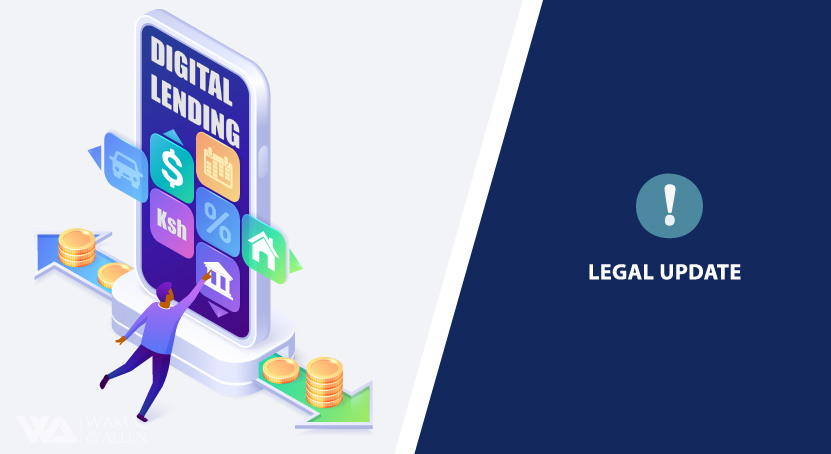Lawrence Lessig, American Academic, Attorney and Political Activist.
A. Introduction
Digital finance are financial services which rely on digital technology for their delivery and use by consumers. In Kenya, digital finance and fintech is largely attributed to the innovations in mobile money transfer. Mobile money technology has spurred growth in the digital finance amongst with which is the growth of digital lending.
On or about 2012, we saw an emergence of digital lenders, where the products were formed between commercial banks in partnership with mobile network operators. However, the industry has grown with start-ups eyeing a piece of the pie.
Growth in the sector has been on the rise, due to increased accessibility to mobile platforms and increased mobile penetration compared to accessibility of other more formal financial institutions. The popularity of digital lending is attributable to the convenience, ease of access and fast remittance of digital loans. But what really is digital lending? Digital lending refers to the process of offering loans through digital channels e.g., app-based programs.
Largely the industry remained unregulated due to the fact that some players were non-deposit taking institutions, thus, they did not fall under ambit of regulation from Central Bank of Kenya. Accordingly, this would mean that the app-based lenders would not be subject to any laws affecting interest-rate capping, disclosure of financial reports and/or requirements for licensing. For instance, interest rate capping took effect in September 2016, through the enactment of the Bank (Amendment) Act No. 25 of 2016. Though the interest rate capping provisions would later be repealed through the Finance Act 2019. .
B. The Central Bank Of Kenya (Amendment) Act 2021
According to research conducted by Reel Analytics, in every 100 Kenyans who were polled, 55 had acquired loans from digital lending applications or platforms. Due to the increased use of digital lending platforms by a majority of the population, there was urgent need for regulation, hence the enactment of the Central Bank of Kenya (Amendment) Act, 2021 (‘The Amendment Act”).
The principal object of the Act is to amend the Central Bank of Kenya Act, (“The Principal Act”) to provide for licensing of digital credit service providers, who are not regulated under any other law.
Among the significant amendments is the introduction of Part VIC, Regulation of Digital lenders under the Principal Act. The changes brought about by the Amendment Act are highlighted below;
Definition of terms
Section 2 of the Principal Act is amended by inserting the following terms;
| Digital channel | The internet, mobile devices, computer devices, applications and any other digital systems as may be prescribed by the bank |
| Digital credit | A credit facility/arrangement where money is lent/borrowed through a digital channel |
| Digital Credit Business | The business of providing credit facilities /loan services through a digital channel |
| Digital Credit Provider | A person licensed by the bank to carry on digital credit business |
| Specified Digital Credit Provider | A licensed digital credit service provider within the meaning of section 33R |
Mandatory Licensing of digital credit providers
Under Section 33S, a person shall not carry on any digital credit business unless they have been licensed by the Central Bank of Kenya or permitted to do so under any other written law.
The application for a license is made to the Bank in the prescribed form and should be accompanied by the prescribed information and fee. A person who conducts a digital credit business without obtaining a license is guilty of an offence and is liable, upon conviction, to imprisonment for a term not exceeding three years, a fine not exceeding five million shillings, or both
Powers of the Central Bank in relation to digital credit providers
In order to regulate digital credit businesses, the Central Bank of Kenya has the following powers as provided for under Section 33R;
- Licensing of digital credit providers
- Determining the capital adequacy requirements for digital credit providers
- Determining the minimum liquidity requirements for digital credit providers
- Approving digital channels/business models through which digital credit business may be conducted
- Supervising digital credit providers
- Suspending/revoking a license
- Direct/require such changes as the bank may consider necessary
Disclosure of information
Section 43 of the Principal Act is amended to the effect that specified digital credit providers shall furnish to the Bank any information or data the bank may reasonably require for the proper discharge of its functions.
However, under Section 43(2), the Bank may not publish information furnished if the same would disclose the financial affairs of any person/ undertaking unless the bank first obtains prior written consent from the person/ undertaking.
Regulations under the Act
The Amendment Act introduces Section 57(3) which provides that the Bank may make regulations as are necessary, expedient to give full effect to the provisions of the Act including;
- Registration requirements for digital credit businesses
- Management requirements for digital credit businesses
- Permissible and prohibited activities
- Anti- money laundering and measures for countering financing terrorism
- Credit information sharing
- Data protection
- Consumer protection
- Reporting requirements for digital credit businesses
- Offences & penalties
The Amendment Act also introduces Section 59 which is to the effect that the regulations on digital lending shall be made within 3 months of the coming into force of the Act.Any person who, before the coming into force of the Act, was in the business of providing credit facilities /loan services through a digital channel and is not regulated by any other law, shall register with the bank within six months of coming into force of the Act.
C. Conclusion
The Amendment Act gives the Central Bank of Kenya wide powers to regulate the growing digital lending business, including issuance and revocation of licenses. The regulations by the Bank will ensure that only digital credit providers who meet the requirements engage in digital credit business.
The transfer of personal data through digital channels raises data privacy concerns. Digital lenders have in the past been accused of engaging in ‘debt shaming practices’ including disclosing defaulting debtors’ existing debts to employers and family members.
Digital lenders are subject to the Data Protection Act, 2019 and as data controllers, they should not disclose information to third parties without first obtaining consent of the data subject. We also anticipate that the intended regulations will address the use of personal data by digital lenders.
However, we note for the digital credit providers a look at how banks have been regulated, through the various regulations such as the Prudential guidelines, can give them an idea of what changes shall be seen in the future of the industry.
This article is provided free of charge for information purposes only; it does not constitute legal advice and should not be relied on as such. No responsibility for the accuracy and/or correctness of the information and commentary as set out in the article should be held without seeking specific legal advice on the subject matter. If you have any query regarding the same, please do not hesitate to contact Kennedy Kithinji Mathiu or Damaris Katumbi Muia vide kennedy@wamaeallen.com or damaris@wamaeallen.com.












